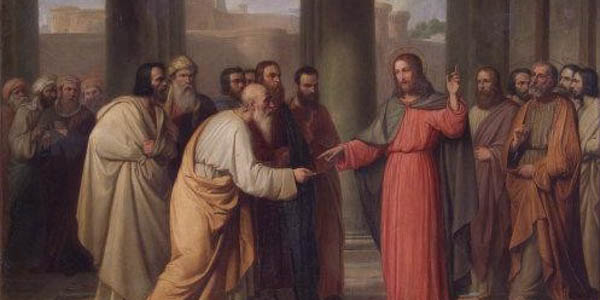Lenten Campaign 2025
This content is free of charge, as are all our articles.
Support us with a donation that is tax-deductible and enable us to continue to reach millions of readers.
The Pharisees approached Jesus and asked, “Is it lawful for a husband to divorce his wife?” They were testing him. He said to them in reply, “What did Moses command you?” They replied, “Moses permitted a husband to write a bill of divorce and dismiss her.” But Jesus told them, “Because of the hardness of your hearts he wrote you this commandment. But from the beginning of creation, God made them male and female. For this reason a man shall leave his father and mother and be joined to his wife, and the two shall become one flesh. So they are no longer two but one flesh.” —Mark 10:2-8
When these readings were proclaimed on the 27th Sunday of Ordinary Time three years ago, the Church was marking the opening of the XIV Ordinary General Assembly of the Synod of Bishops. That three-week gathering of bishops, theologians, and lay Catholics explored the opportunities and challenges faced by families—and the Church—in the world today.
This year, we are in the first days of another Synod of Bishops, this time focusing on young people, the faith, and vocational discernment.
The participants in the Synod, including young adults from throughout the world, have already touched on a number of challenging themes, including the clergy sex abuse scandal, the pastoral needs of Catholics who identify as gay, lesbian, bisexual, or transgender, and questions around the care of refugees and migrants.
It seems providential that our liturgy this Sunday invites us to reflect on marriage and family as the Synod participants reflect on these and other important issues.
The first part of this Sunday’s Gospel recounts a discussion between Jesus and the legalistic Pharisees about divorce. To make their case, the Pharisees looked back to the Book of Deuteronomy (24:1-4) in which Moses allows for a man to divorce his wife and dismiss her from his house. In those days, however, divorce was a somewhat different reality than we know today. The male-oriented social system permitted a man to divorce his wife simply because he found something objectionable in her. Some rabbis said that divorce could only happen if the wife committed adultery, while others argued that a husband was within his rights to seek a divorce for a slight offense, such as a poorly cooked meal (cf. Rabbi Hillel, Mishna Gittin 9:10). Women were not permitted to seek divorce.
Jesus doesn’t take the bait, however. Rather than debate the teaching of Moses, interpreting it as a concession to a hard-hearted people, Jesus redirects the discussion to the ideal union of man and women presented in the second chapter of Genesis (the First Reading).
Genesis tells us that after man was created, God recognized that he needed a “suitable partner” or “a helper” (2:18). The man and the woman were created to live and work together in mutuality and equality. Adam’s response to the gift of the woman beautifully captures this compatibility: “At last, this one is bone of my bone and flesh of my flesh.”
As Pope Francis observed, however, “Man and woman, through the astuteness of the devil, learned to separate themselves from one another. And all the love that God gave was almost lost. In a brief period of time … the first crimes, the first fratricide, brother killed a brother, the first war.” Damage was done and the beauty and simplicity of that first relationship was lost. But that wasn’t the end of the story.

Read more:
What we can learn about mercy from the Aramaic word Jesus used for it
And here we come to the second part of this Sunday’s Gospel passage, in which Jesus tells his followers that they must become like little children if they hope to enter the Kingdom of Heaven. But he isn’t advocating a naive, irresponsible, or adolescent approach to life. Rather, Jesus is inviting each of us to adopt the openness and receptivity of children in our approach to God and in our relationships with one another. This open and embracing spirit is also necessary for healthy marriages and families. While divorce will always be a possibility faced by couples and families, Jesus is offering another way that is based on the integrity and beauty of the experience of our first parents.
As families and communities continue to face the demanding realities that are part of growing healthy relationships, Jesus’ call for openness, receptivity, and mutuality provide a powerful antidote to our culture’s message of individuality and exclusion.
How do I respond when conflicts arise in my marriage and in my family?What can I do to support, encourage, and welcome those who have experienced divorce or family struggles?How is God calling me to childlike openness in my relationships? What could this mean for me, my spouse, and my family?What can I do to pray for and support the work of the Synod of Bishops in the coming weeks?
Words of Wisdom: “The very word ‘to be joined’ or ‘to cleave,’ in the original Hebrew, bespeaks a profound harmony, a closeness both physical and interior, to such an extent that the word is used to describe our union with God: ‘My soul clings to you’ (Ps 63:8). The marital union is thus evoked not only in its sexual and corporal dimension, but also in its voluntary self-giving in love. The result of this union is that the two ‘become one flesh,’ both physically and in the union of their hearts and lives, and, eventually, in a child, who will share not only genetically but also spiritually in the ‘flesh’ of both parents.”—Pope Francis, Amoris Laetitia, 13
Read more:
Don’t be robbed of the best of yourself, Pope Francis tells youth

